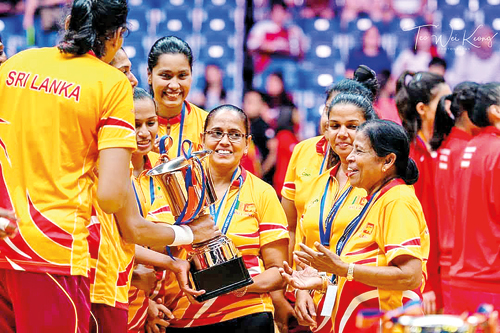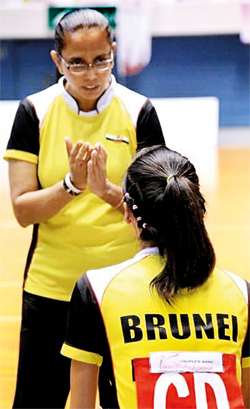Thilaka’s role and goal: Empowering women through sports
View(s):
Thilaka Jinadasa savouring triumph as Sri Lanka netball coach
Sri Lanka’s first female Olympian Thilaka Jinadasa wants to empower women in sports and become a role model for youngsters by focusing on coaching education programmes instead of sitting in administration.
Sri Lanka’s nominee for the IOC Women and Sport Award 2021 more than three decades after creating history at the 1988 Seoul Olympics, Thilaka is invigorated to inspire the next generation with her vast expertise as a player and coach.
“I feel it is a great honour and privilege being nominated as the IOC nominee of the Women and Sport Award. I have been involved with two sports at the very top level – as an athlete and an administrator cum coach and my greatest passion in this is my ability to uplift the cause of women’s sport in this country and fight towards equality in sport,” she stated.
Being a double international in athletics and netball, she is in a unique position to educate children having climbed the ladder of success despite coming from a humble background.
 “My prime objective at the moment is to work with young athletes and promote them… kind of being a role model for them. I can share my experiences of how I came from nowhere. I went to Sri Jayawardenepura and was from a middle class family. It was not a walk in the park for me. I had a lot of difficulties,” she said unapologetically.
“My prime objective at the moment is to work with young athletes and promote them… kind of being a role model for them. I can share my experiences of how I came from nowhere. I went to Sri Jayawardenepura and was from a middle class family. It was not a walk in the park for me. I had a lot of difficulties,” she said unapologetically.
A former champion hurdler who retired from the sport at the height of her career to pursue her passion netball, Thilaka set herself targets as an athlete and netballer before becoming a great influencer as a coach.
The only Sri Lankan athlete to have represented the country in five consecutive South Asian Games and won medals in all Games including one gold (Calcutta), four silvers and four bronze medals, she walked away from athletics after achieving a national record of 14.38 seconds at the Asian Championships in Kuala Lumpur. She was also vice-captain when Sri Lanka won the Asian Netball Championship title in 1997 in Singapore.
However, as an athlete, she felt there was a lack of women participation in sports in Sri Lanka. Therefore, she decided to become a coach to promote women in sports. Thilaka became an international netball coach, IAAF Level-1 Athletics Coach and Australian Strength and Conditioning Level-1 Coach.
Under her guidance, Sri Lanka won the Asian Netball Championship title twice in 2009 and 2018. Sri Lanka qualified on both occasions to compete at the World Cup Netball Championship in 2011 and 2019.
She also served as netball coach for the national teams of Maldives and Brunei Darussalam. Under her guidance, Brunei won their very first medal at the South East Asian Games.
“I really wanted to promote women sports. That’s why I chose netball because only women are involved. There are less opportunities for women. If you look at sports associations, apart from netball even in athletics there are only one or two women,” she said blaming the system for this imbalance.
“We being Olympians, we being national athletes, we being national record holders, we still don’t have opportunities. There is something wrong with the system,” added Thilaka who is relishing her role as Team Leader Sports Development at Gateway Group after ending her contract as netball coach last year.
“That’s why I said okay to Dr Alles when he invited me to join them. Being a national coach, I could have gone somewhere else. I thought why not I serve my country and look after the children and do something for the younger ones. It doesn’t mean I don’t have ambitions to come back as a national coach. I always have the passion. I still believe we still can win in Asia and fight for the world championship. For the time being with what is happening to sports, I just want to stay out,” she said.
“I want to work with children, motivate them, introduce some different skills for them. We really need to wake them (girls) up. Work on their basic fundamentals to keep their fitness,” stressing on the need for conditioning training than sports specific exercises.
“In Sri Lanka we forget about our condition. Rather than physical fitness, they try to master technique in the sport. Before sport specific you need to build up condition. Whatever you do, you have to be an athlete,” she said relating the advantage she had of being an athlete when she became a netball player.
“That’s why we are facing injuries. If you are not conditioned enough, you cannot start fundamentals. Even swimmers have to do land training,” said Thilaka who is also a working member of the International Council for Coaching Excellence and is involved in the development of coaching systems in emerging countries.
Asked why Sri Lanka could not achieve success at Olympic or even Asian level more regularly, she was of the opinion that it was because of a lack of long-term planning and international exposure. “Damayanthi Darsha, Susanthika Jayasinghe and Sriyani Kulawansa succeeded at Asian level because they competed regularly in Grand Prix events. People laughed when then Sports Minister S.B. Dissanayake gave them all facilities. He had a four-year vision,” she said, pointing out that Sri Lanka netball could drop in their world rank of 18th unless they play internationally at least once in three months.
“We have a lot of talent but unfortunately currently we don’t have the right system. We have to have a parallel coaching education system and players development. I don’t see it happening. Now there is no national netball pool training which should be ongoing,” she said, also lamenting the fact that 2018 Youth Olympics bronze medallist in the 2000m steeplechase Parami Wasanthi Maristela is lost to the sport.



